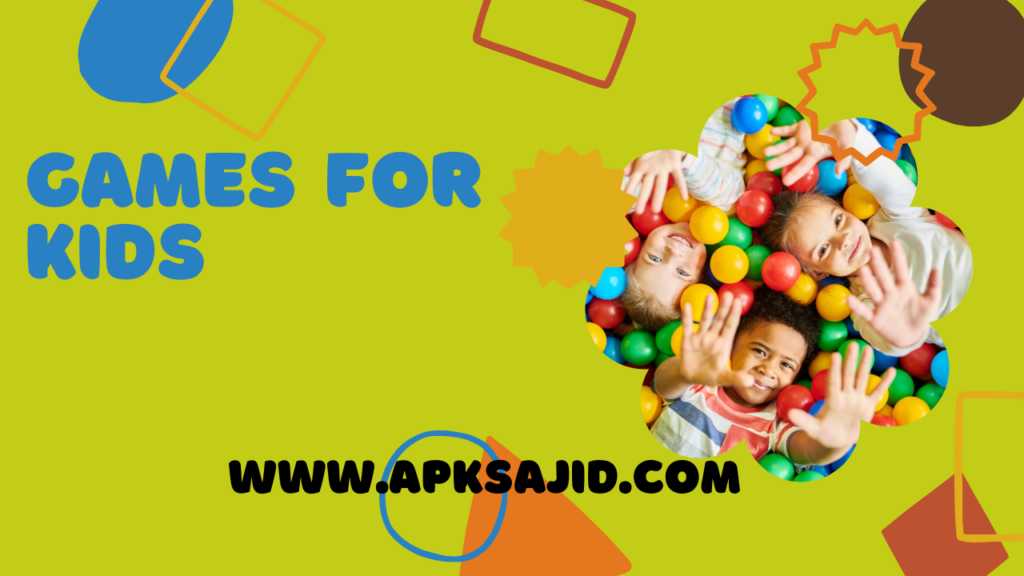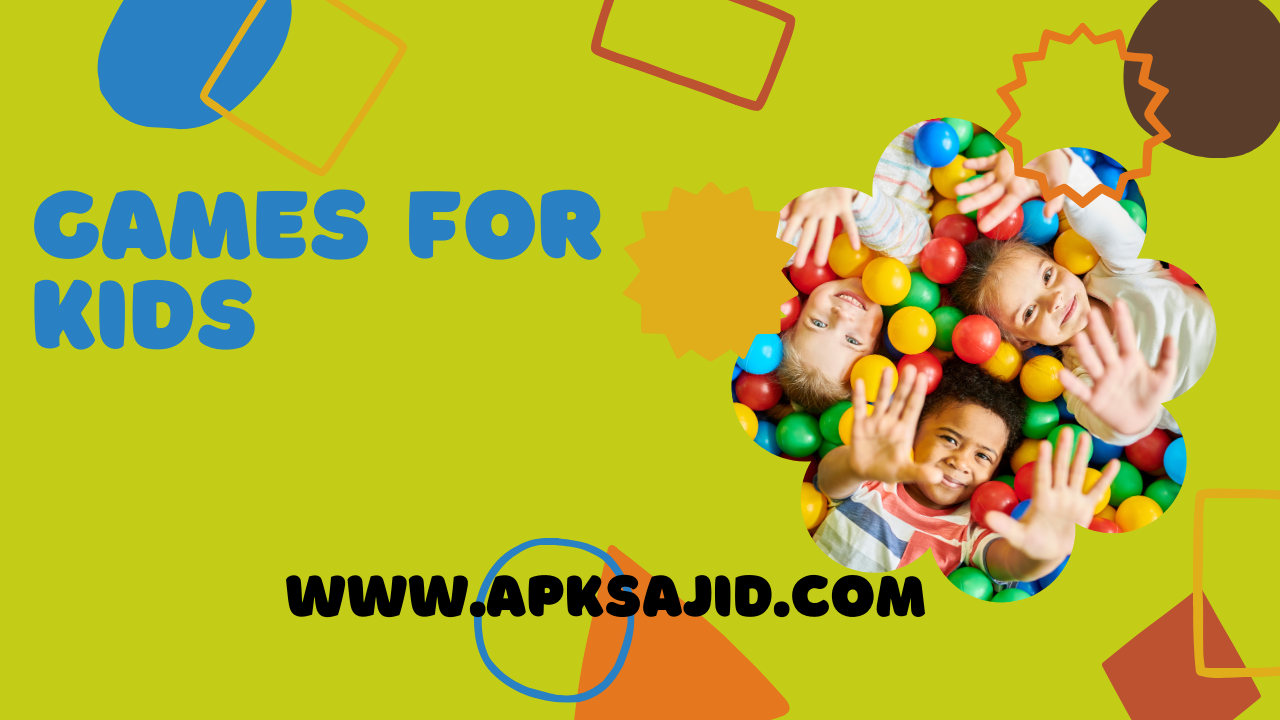Introduction
Games for Kids are not only about entertainment—they play a significant role in helping children develop critical thinking, physical abilities, social skills, and emotional intelligence. From outdoor games that build teamwork to digital games that stimulate creativity, each type of game offers unique benefits for children’s overall development. In this article, we’ll explore various games, from online and educational games to traditional outdoor and engaging indoor options, discussing how each can contribute to a child’s growth.
Benefits of Games for Kids
Games are crucial to child development in three main areas:
- Physical Benefits: Games that involve movement and physical activity build motor skills, improve coordination, and contribute to cardiovascular health. Active play is essential to prevent health issues like obesity and promotes a lifetime of healthy habits.
- Mental Benefits: Puzzles, board games, and digital games stimulate problem-solving and cognitive abilities. Games requiring memory, strategy, or critical thinking can enhance a child’s focus, memory retention, and decision-making skills.
- Social and Emotional Benefits: Playing games—especially in groups—teaches children social etiquette, teamwork, empathy, and resilience. Children learn how to win gracefully, handle losses, and work towards common goals, which are invaluable social skills.
Popular Online Games for Kids
Online games designed for kids offer a variety of learning experiences in a format that’s accessible and engaging. With the right choice, online games can offer a wealth of knowledge and interactive fun. Here are some reputable websites that offer games designed to be both safe and educational:
- ABCya: Known for its math and reading games, ABCya covers various grades and topics. Its games are structured around core subjects, helping kids strengthen foundational skills in an engaging way.
- National Geographic Kids: Combining education and fun, National Geographic Kids provides interactive games on wildlife, geography, and environmental issues. Children learn about the planet while enjoying beautifully crafted games.
- PBS Kids: The games on PBS Kids cover subjects like literacy, science, and social studies. With characters from popular educational TV shows, the games are tailored to young learners and make learning feel like an adventure.
These websites offer kids a safe environment to play games that are free of inappropriate content and advertisements.
Also Read Unlocking Riddles For Teens
Educational Games for Games for Kids
Educational games are specifically designed to aid children in developing essential skills. These games are tailored to stimulate curiosity, teach basic academic skills, and build problem-solving abilities. Here are some examples of popular educational games that foster learning:
- Math Games: Games like Prodigy and Cool Math Games help children learn basic arithmetic, fractions, and even algebra in an interactive way. The challenges progress in difficulty, allowing children to feel a sense of accomplishment as they advance.
- Language Arts Games: Language games encourage children to expand their vocabulary, improve grammar, and enhance spelling skills. Starfall and Reading Eggs are excellent resources for young readers and language learners.
- Science and Exploration Games: For children with a curiosity about science, games like BrainPOP and Little Alchemy introduce scientific concepts, encouraging kids to experiment, discover, and learn about the world around them.
By providing interactive experiences, educational games make learning enjoyable, often helping children grasp difficult concepts through play.

The Value of Outdoor Games for Kids
Outdoor games are a wonderful way to keep kids active, improve their physical health, and foster social interactions. Traditional outdoor games require minimal equipment, and they encourage children to develop physical endurance, agility, and teamwork. Here are some classic outdoor games for children:
- Tag: Simple yet fun, tag helps children improve their agility and speed. Variations like freeze tag introduce teamwork and strategy.
- Hide-and-Seek: This game encourages problem-solving and planning skills as children learn to find creative hiding spots and seek out friends.
- Team Sports (Soccer, Basketball): Team sports not only improve physical fitness but also teach children the value of teamwork, strategy, and discipline. Soccer, basketball, and baseball are some popular team sports enjoyed by kids worldwide.
Outdoor games promote a healthy lifestyle and mental well-being, as fresh air and physical activity are beneficial for reducing stress and improving mood.
Indoor Games for Creativity and Problem-Solving
Indoor games are ideal when outdoor play isn’t an option, and they provide a quieter environment for focused activities. These games range from board games and puzzles to building activities, which contribute to cognitive growth and creativity:
- Board Games: Games like Monopoly, Scrabble, and Guess Who? teach kids about strategy, vocabulary, and critical thinking. Playing board games also improves concentration and patience.
- Building Blocks and Lego: Construction activities like Lego stimulate creativity, hand-eye coordination, and fine motor skills. Children learn to follow instructions or create their own designs, both of which are valuable experiences.
- Puzzles: Solving puzzles challenges kids to think critically, analyze, and develop patience. Puzzle games promote spatial awareness, pattern recognition, and memory skills.
Indoor games help children improve their problem-solving abilities and develop patience and resilience while fostering creativity and self-expression.
Digital and Mobile Games: Creative Play
Digital games are a go-to option for many kids, and when chosen wisely, they offer excellent learning opportunities. However, managing screen time is essential, so kids balance these with offline activities. Some popular mobile games that are beneficial for kids include:
- Minecraft: This game has gained worldwide popularity for its open-ended gameplay, allowing children to build, explore, and create. Minecraft encourages creativity and problem-solving skills as kids learn to build structures and complete challenges.
- Animal Jam: Developed with National Geographic, Animal Jam immerses children in a world of animals and ecosystems. This game teaches kids about wildlife, habitats, and the environment while offering a safe, educational space for exploration.
- Khan Academy Kids: This app provides interactive learning games for various subjects, from math to storytelling. It’s an educational resource with a strong focus on skill-building, particularly for young learners.
These games allow children to explore different topics creatively. However, parents should set guidelines on screen time and ensure that digital games complement other forms of learning and play.
Tips for Parents on Choosing Games
When selecting games, parents should focus on a balanced mix that fosters physical, cognitive, and social growth. Here are some helpful guidelines:
- Look for Age-Appropriate Games: Ensure that games are suitable for the child’s age and maturity level. Check age ratings and reviews to understand what each game entails.
- Prioritize Learning and Development: Games that incorporate educational elements are always a good choice. Look for games that can teach life skills, such as math, language, problem-solving, and empathy.
- Encourage a Variety of Games: Instead of relying solely on digital games, include outdoor games, puzzles, and board games to provide a well-rounded experience.
- Set Screen Time Limits: For digital games, establish clear limits on screen time. According to child development experts, balance is key to ensuring that children receive the benefits of digital play without compromising physical activity or face-to-face interactions.
- Play Together: Involving yourself in your child’s games can help strengthen the parent-child bond. It also allows you to monitor their experiences and guide them through any challenges.
- Discuss Online Safety: For games that involve online interaction, educate your child on online safety and privacy, helping them navigate the digital world responsibly.
Conclusion
Games for kids play a vital role in shaping their minds, bodies, and social skills. From educational and online games that build academic skills to outdoor activities that promote fitness, each type of game brings something valuable to a child’s life. Selecting age-appropriate games that balance learning and playtime ensures that children benefit from both digital and physical experiences. Games allow kids to explore, experiment, and discover while nurturing creativity, empathy, and resilience.



